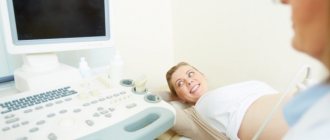The onset of pregnancy is an important and joyful period in the life of every woman.
The first trimester is the most crucial time for the entire pregnancy, as the woman’s body is actively restructuring and experiencing stress. It is important to remember and be aware of the key points to ensure that the pregnancy proceeds well and without complications. The first trimester of pregnancy lasts from the first day of the last menstruation until the 13th week (according to the obstetric period).
What happens to the expectant mother
The first sign of pregnancy is the absence of menstruation. Some women notice the appearance of slight spotting and sometimes mistake it for menstruation, so they can find out about their situation by the middle of the first trimester. If the discharge is not abundant, this is normal. One possible reason is the attachment of the embryo to the wall of the uterus.
Another striking symptom of pregnancy is toxicosis. It manifests itself in the form of nausea and vomiting, increased salivation, changes in taste preferences and special sensitivity to odors. It is believed that toxicosis is the body’s reaction to embryonic cells that are “alien” to it. The immune system adapts towards the end of the first trimester. In the meantime, you should be patient, follow a daily routine, eat portions, in small portions, and look for your own way to combat nausea. Some people benefit from crunchy snacks, while others benefit from ginger tea. It is believed that taking folic acid also reduces the symptoms of toxicosis.
Other changes in the body of a pregnant woman
- Frequent urination is associated with the pressure that the growing uterus puts on the bladder.
- Constipation and flatulence - occurs under the influence of progesterone, which reduces smooth muscle tone and slows down intestinal motility.
- Breast pain - the condition is caused by the preparation of the mammary gland for lactation.
- Fatigue and drowsiness, which can only be overcome by getting enough sleep at night and taking extra rest during the day.
- Dizziness and loss of consciousness occur against the background of a decrease in blood pressure due to the active blood supply to the uterus.
Please note that these symptoms do not occur all at once and not necessarily in everyone. Some women do not notice any special changes in the 1st trimester of pregnancy.
How does the baby develop in the 1st trimester?
On average, 6 days after fertilization, the embryo will reach the uterus and attach to its wall. Then the amnion is formed, from which the amniotic sac will later develop, and the placenta, through which the unborn child will receive all the nutrients and oxygen.
At 5-6 weeks, the cardiovascular system, liver and spleen, respiratory tract, and neural tube begin to develop, which subsequently transforms into the nervous system. The embryo develops the rudiments of legs and arms. In the middle of the 1st trimester of pregnancy, during an ultrasound, you can already hear his heart beating - at a frequency of 120-140 beats per minute. The brain is actively forming: it is divided into 2 hemispheres, primary neural connections are formed.
From 8-9 weeks of pregnancy, the baby turns from an embryo into a fetus, since by this moment all organs and systems have already been formed. The reproductive system is developing, eyelids, jaw contours, and nose are already visible on the face. Fingers appeared on the hands and feet.
By the end of the first trimester, the fetus already weighs 15-20 grams. He moves actively, knows how to frown, yawn, and sucks his thumb. Distinguishes the taste of mother's dinner and hears everything that happens outside the womb.
The importance of the initial period
Despite the fact that the first month of pregnancy is quite difficult to determine, it is the most important for the health of the unborn child. It is in the first month that implantation occurs, the correctness of which determines both the future course of pregnancy and the development of the fetus. Ideally, if pregnancy is planned in advance, then even before its onset the woman adjusts her lifestyle, gives up bad habits and switches to a healthier diet. If pregnancy turns out to be a surprise, then at the first, even indirect, signs, you should switch to a healthy lifestyle as quickly as possible.
Particular attention should be paid to the nutrition of the expectant mother. Here's what the WHO Regional Office for Europe report on Healthy maternal nutrition: a better start in life says: “Inadequate maternal nutrition in the earliest stages of life, in utero and early life can have both short- and long-term consequences. impact; in particular, increase the risk of non-communicable diseases and obesity throughout later life. <…>Poor nutritional conditions before and during pregnancy can cause short-term and long-term changes in weight-height parameters, body composition and metabolic reactions of the offspring.”*
Tests and ultrasound of the first trimester
You can register for pregnancy at the antenatal clinic from 8-9 weeks. You will have to undergo an extensive list of tests:
- general and biochemical blood test;
- general urine analysis;
- tests for HIV, AIDS, hepatitis, TORCH infections and STDs;
- coagulogram;
- smear on vaginal microflora.
It is also important to determine your blood type and Rh factor; an ECG is performed to diagnose possible heart pathologies.
The gynecologist will give you a referral to other specialists: a therapist, an ENT specialist, a dentist, an ophthalmologist. If you have chronic diseases, you should consult with specialized doctors.
First pregnancy screening
Consists of an ultrasound and a blood test for the hCG hormone and PAPP-A protein. Performed from 10 to 13 weeks of pregnancy. Allows you to identify complex fetal malformations, including those incompatible with life. The results are not final; sometimes invasive diagnostic methods are required - chorionic villus biopsy or amniocentesis.
Possible problems in the first trimester
Of particular danger in the first trimester of pregnancy are complications such as ectopic and frozen pregnancies, increased uterine tone and the threat of miscarriage. Alarming symptoms for which you should immediately seek medical help are:
- bloody vaginal discharge, especially abundant and scarlet in color;
- severe weakness and fever;
- a woman has a tightening in her lower abdomen, the pain can be sharp and sudden;
- Symptoms of pregnancy suddenly disappear - nausea, engorgement of the mammary glands.
To confirm the diagnosis, a blood test for hCG and ultrasound diagnostics are required. Treatment is most often carried out in a hospital setting. It will not be possible to save an ectopic or frozen pregnancy; in these cases, it is more about the life and health of the woman. In case of increased tone or threat of miscarriage, help can be obtained in most cases; it is only important to contact specialists in time.
The best prevention of complications
- Pregnancy planning, which includes a preliminary consultation with a gynecologist, a series of tests and treatment of sexually transmitted diseases - common causes of infertility and miscarriages.
- Proper nutrition, adequate sleep and a healthy lifestyle. Such seemingly simple rules help to successfully conceive and bear a child.
- Regular visits to the gynecologist. Don't miss scheduled visits to your doctor to ensure timely diagnosis of problems during pregnancy.
How to prepare your breasts so that there are no cracks?
Obstetrician-gynecologist advice. Every evening a woman should take a shower and do the necessary exercises for her breasts under the shower. This is done like this: the woman carefully tightens the nipples, takes a washcloth or waffle glove, lathers the breasts with gel or soap and massages them clockwise and from the periphery to the nipple (do not forget to massage the lower part of the breast). After leaving the bath, take a towel (preferably a waffle one) and rub the nipple and area around the nipple. After rubbing, be sure to treat the pigment part with any alcohol tincture (rotocan, romazulan, calendula and others). This serves to prevent cracks. In the morning after a shower, you need to lubricate your stomach, chest, thighs and buttocks with rich cream. To better prepare the nipples, thin linen pads can be inserted between the breasts and the bra.
The editors thank the network of clinics of the INPROMED Family Health Centers for their assistance in preparing the material.
Do's and don'ts
Fortunately, it is quite difficult to harm a healthy pregnancy, and most common prohibitions are simply myths and prejudices, such as the belief that a pregnant woman should not cut her hair or knit.
Among the unconditional prohibitions of the first trimester of pregnancy are lifting weights, smoking and alcohol, heat stress, and hazardous sports.
Is it possible to have sex?
If there are no contraindications, then intimate intimacy at any stage of pregnancy will not harm the fetus. It is reliably protected by amniotic fluid and the walls of the uterus. Therefore, decide this issue based on your own desires, and if you have any disorders, for example, vaginal bleeding, be sure to consult a gynecologist.
Can I take medications?
The effect of many drugs, especially in the first trimester, has been poorly studied in pregnant women. Therefore, it is better to consult a specialist. Sometimes you simply cannot do without medication, as, for example, with a high temperature. Prolonged fever is dangerous for the fetus, so it must be stopped. If you have a chronic disease that will lead to serious deterioration without treatment, you should choose the safe ones together with your doctor.
Nutrition, vitamins and minerals
There is no special diet for pregnant women. There is no need to eat for two either. Your diet should be healthy and balanced, that is, it must include 3-4 servings of vegetables and fruits, 2-3 servings of cereals and cereals, lean meat and fish, and dairy products.
Since nutrition should be healthy, it does not involve eating cakes, sausages, or fast food. But if the pregnancy proceeds without complications, then nothing bad will happen from one cake a week or sausage. The main thing is that it is infrequent.
There is no need to eliminate red fish, peanuts, chocolate, citrus fruits or other common allergens unless you have a reaction to them. It has been proven that such a diet does not prevent the development of allergies in a child.
Alcohol is prohibited in all trimesters of pregnancy because it has a teratogenic effect, that is, it disrupts the development of the fetus by penetrating the placenta.
Do you need multivitamins?
Until recently, all pregnant women were prescribed vitamin complexes. Now experts believe that it is better to “extract” all the necessary microelements and vitamins from ordinary foods. If your diet is varied, this is not difficult to do. But in addition you should still take:
- folic acid, which reduces the risk of neural tube pathologies in the 1st trimester of pregnancy;
- vitamin D, a deficiency of which occurs in our region due to prolonged absence of sun throughout the year;
- iron supplements - if you do not eat meat or are predisposed to anemia (you have an asthenic physique or have previously decreased hemoglobin).
Sources
- Williams R., Kothny W., Serban C., Lopez-Leon S., de Vries F., Schlienger R. Association between vildagliptin and risk of angioedema, foot ulcers, skin lesions, hepatic toxicity, and serious infections in patients with type 2 diabetes mellitus: A European multidatabase, noninterventional, postauthorization safety study. // Endocrinol Diabetes Metab - 2021 - Vol2 - N3 - p.e00084; PMID:31294090
- Aguirre-Romero AB., Galeano-Valle F., Conde-Montero E., Velázquez-Tarjuelo D., de-la-Cueva-Dobao P. Efficacy and safety of a rosehip seed oil extract in the prevention and treatment of skin lesions in the hands of patients with type 1 diabetes mellitus caused by finger prick blood glucose monitoring; a randomized, open-label, controlled clinical trial. // Endocrinol Diabetes Nutr - 2021 - Vol67 - N3 - p.186-193; PMID:31235400
- Saito H., Ebashi M., Kushimoto M., Ikeda J., Egashira F., Yamaguchi S., Watanabe K., Ogawa K., Suzuki Y., Ishihara H., Fujishiro M. Elsberg syndrome related to varicella zoster virus infection with painless skin lesions in an elderly woman with poorly controlled type 2 diabetes mellitus. // Ther Clin Risk Manag - 2021 - Vol14 - NNULL - p.1951-1954; PMID:30349274
- Shenavandeh S., Anushiravani A., Nazarinia M.A. Diabetic muscle infarction and diabetic dermopathy two manifestations of uncontrolled prolong diabetes mellitus presenting with severe leg pain and leg skin lesions. // J Diabetes Metab Disord - 2014 - Vol13 - N1 - p.38; PMID:24559137
Checklist for the 1st trimester of pregnancy
- Get your first pregnancy screening before the end of the first trimester.
- Visit your gynecologist regularly, and before each visit, do not forget to take a general urine test.
- Don't forget about physical activity: it reduces the risk of pregnancy complications and prepares the body for childbirth.
- Before the cold season, be sure to get a flu shot; it is safe for both you and the fetus.
- Eat a healthy diet, stop smoking, and limit your caffeine intake to 200 mg per day.
- Check out our pregnancy calendar to know what you need to be prepared for at different stages of pregnancy.
Entrust your pregnancy management to the specialists of the Medical Women's Center. All tests, screenings, studies and consultations with specialists at a time convenient for you under one roof. We create individual observation programs and have successful experience in supporting complicated pregnancies.
Advantages of pregnancy management in our clinic
The Department of Gynecology and Obstetrics of the Pirogov Clinic on Vasilievsky Island (St. Petersburg) is among the TOP 3 best in the city according to the results of the VIII and IX ranking of private clinics (2018-2019). You can view reviews about pregnancy management on our website, as well as on independent platforms. By contacting us, you can be sure of high diagnostic standards and professionalism of doctors. We offer our patients:
- Services of experienced, attentive and caring obstetricians-gynecologists - our specialists worked and improved their skills in clinics in Finland, France, the USA, as well as in maternity hospitals in St. Petersburg.
- Having your own laboratory and all specialized doctors in one place, as well as medical offices equipped with new generation equipment. You can undergo all examinations in a comfortable environment and without queues. We guarantee the reliability of the results. There is no need to come pick them up - we will send everything by email.
- Remote video consultations with gynecologists (online).
- Affordable prices for pregnancy management in the 1st, 2nd, 3rd trimesters.
- Possibility of paying for services in installments.
- The clinic is located on Vasilyevsky Island - in a picturesque historical area not far from the station. m. Vasileostrovskaya.
- Pregnancy management under VHI.
You can make an appointment with a gynecologist through our website or by calling 320-70-00.








